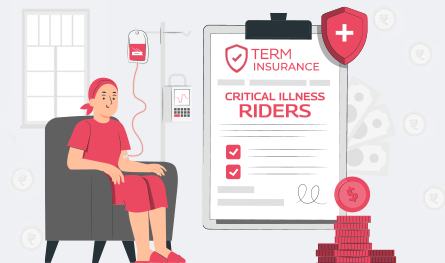Best-term insurance policies with critical illness riders

Term insurance is a pure life insurance product that offers death benefits to the insured individual's dependent family members, provided the insured and the policyholder are the same. This sort of insurance product usually has no investment or savings component but acts as a premium safety net during tough times.

You can enhance the coverage expanse of your term plan by adding befitting riders to the base plan. One of the most significant riders that deserves special mention here, is the critical illness rider.
What is term insurance with a critical illness rider?
As the name suggests, this sort of term plan has a critical illness rider attached to the base plan. You can exercise this facility during term plan purchase or at any time throughout the plan term.
In case you get diagnosed with any plan-listed critical ailments, then the insurer will offer a lump sum payout, which can be utilised for continuing with the treatment process, medicines, etc.
Some of the most popular critical ailments that are usually covered under such plans include cancer, heart issues, kidney failure, stroke, etc.
This benefit significantly enhances the coverage expanse by paying an additional premium.
Benefits of having term insurance with critical illness rider
Wondering if this investment is worth it? Let’s dive into more details.
Although you need to pay an additional premium for a critical illness rider or any rider whatsoever, the term plan offers multiple benefits:
1. Single payment without deductions:
In case you get diagnosed with a listed critical ailment, you can focus on your treatment and recovery without worrying about finances. Your term insurance with a critical illness rider will take care of these associated expenses, including surgery costs, medicines, ambulance charges, hospitalisation expenses, etc.
2. Protection for medical expenses:
The term plan with CI rider offers a lumpsum amount to cover medical expenses. It can cover all the associated treatment and healthcare costs, protecting your hard-earned savings. Usually, the treatment costs for any sort of critical ailment are on the higher side and often long-term, enough to jeopardise your current financial conditions.
3. Lost income replacement:
The lumpsum payout under significant critical disease coverage can easily act as a supplement to your income loss during the treatment phase. You can even use this payout for managing usual household expenses like paying bills, debts, etc.
4. Tax benefits:
The term insurance plan allows tax benefits u/s 80C of the IT Act of 1961. However, the best term insurance plan is one with a critical illness rider allowing additional tax benefits u/s 80D, significantly reducing the overall tax benefits. The optimum tax deduction limit under this section is INR 25,000, while for senior citizens, this limit rises to INR 50,000 per financial year.
5. Unaltered premium:
The premium payable amount remains unaltered even after the detection of any listed critical ailment. However, you need to add this rider during the policy purchase. You need to once pay an additional premium during this time, which is slightly higher than the base plan, but this amount remains constant.
6. Improved survival chances:
If you possess a term plan with a critical illness rider, you need not have to worry about finances and focus on your treatment and recovery. This sort of insurance allows you to acquire quality treatment facilities without losing your peace.
Exclusions
Even the best term insurance plan does not offer 100% coverage. There are certain typical exclusions which are common for all term plans irrespective of the insurers:
- Waiting period: The listed critical ailment needs to be addressed by a specialist within 4 years of plan issue or renewal.
- STDs: No form of STDs gets this insurance coverage under any circumstances.
- Lifestyle: If your critical ailment proves to be a direct effect of your improper lifestyle, like indulging in smoking or drinking, then you will not get insurance coverage.
- Suicide: Any ailment resulting due to self-inflicted injury or suicidal attempts does not get covered.
- Dangerous activities: You cannot avail of insurance coverage for health ailments resulting from active and voluntary involvement in dangerous activities like non-commercial aviation activities, radioactive contamination, bungee jumping, scuba diving, car racing, etc.
- Not seeking medical help: Avoiding professional medical help to avoid the designated waiting periods will also be excluded. The waiting periods vary depending on the insurer and the chosen plan concerned.
- Donor costs: The treatment costs for the donor due to organ replacement do not come under the purview of this plan.
- Age of the ailment: This plan does not cover ailments diagnosed 17 years prior to the plan issuance because of any disability or inherited health issue.
Pro tips about term plans with critical illness rider
Interested in smoothening the journey while buying a term plan with CI coverage? Remember these vital points:
- Life cover payout: The beneficiary receives the payout in case the insured person, who is the policyholder, passes away during the plan term.
- Lump sum payout: The lump sum payout under the CI rider is available on the diagnosis of any listed critical ailment.
- Survival period: Depending on the terms of the chosen plan, there usually exists a survival period after the detection of the disease. This means that the concerned individual must live that tenure to avail of the policy benefits.
- Plan terms: Not all plans cover all critical ailments. It varies with the chosen plan type and the insurer concerned.
- Waiting period: Usually, term plans come with a waiting period clause for certain typical ailments, before which you cannot raise any claim for those issues. Check it out before finalising, as the lower this period, the better it is.
- Policy payment: The policy payment can either be in a lump sum or at regular frequencies for a certain specific period or the entire plan term.
- Tax benefits: You can avail of additional tax benefits by adding a CI rider to your basic term plan.
So, which is the best term plan with critical illness rider?
It is true that adding a CI rider indeed raises your premium payable amount for the term plan. However, it is nominal when compared with the benefits offered. You can check with the experts from Paybima to help you understand which plan best fits your needs!

Author Bio
Paybima Team
Paybima is an Indian insurance aggregator on a mission to make insurance simple for people. Paybima is the Digital arm of the already established and trusted Mahindra Insurance Brokers Ltd., a reputed name in the insurance broking industry with 17 years of experience. Paybima promises you the easy-to-access online platform to buy insurance policies, and also extend their unrelented assistance with all your policy related queries and services.
Other Life Insurance Products
Latest Post
In a country where medical inflation is rising rapidly, securing a comprehensive health coverage plan for the entire family is no longer optional, it is essential. Selecting the right health insurance requires careful evaluation of multiple factors, not just premium costs. A well-chosen plan ensures financial security, access to quality healthcare, and peace of mind during medical emergencies.


Term insurance is an important investment. However, with the availability of so many insurers offering term plans, it becomes difficult to select the best term plan to suit your needs. Buying a term plan needs some consideration and research on the part of the policyholder. In this post, let us discuss the best term insurance providers in India.


Have you ever caught yourself lost in illusions about your daughter's future events, such as her university convocation and first day at work? Her university convocation. When she embarks upon her initial job after graduation will be the day.

.png)
When you sign up for a life insurance policy - whether it’s a traditional term insurance policy or a ULIP – you are not just buying peace of mind. You are also trusting the insurer with your money. So naturally, you would want to know: How is that money being managed? And more importantly, how is it being protected from risky decisions?

.png)
Globally, 20th October marks the day to observe World Osteoporosis Day. Do you know the significance of observing Osteoporosis on a global platform? Do you know how this condition affects people and their lives? Let us find out in this post!




